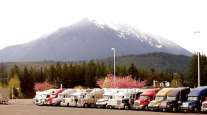Senior Reporter
CARB Proposes Exemptions for Transitions to Electric Trucks

[Stay on top of transportation news: Get TTNews in your inbox.]
The California Air Resources Board is making plans to modify its proposed Advanced Clean Fleets regulation to address possible electric charging infrastructure delays and unavailability of models of zero-emission trucks.
The plan, if approved by the CARB board, includes a provision to delay zero-emission truck purchases up to five years due to charging infrastructure construction delays, and a right for a fleet to buy a California-certified truck with an internal combustion engine when there is no electric truck with “equivalent configurations” available for purchase. However, motor carriers will be required to make a strong case to be granted exemptions.
The revisions to the long-term regulation aimed at transforming diesel trucks to electric trucks in the state were outlined in documents provided at a CARB workshop on Jan. 13.
CARB staff is expected to continue discussions on the modifications at a workshop meeting Feb. 13 and the CARB board is expected to vote on adopting the final regulation sometime in late April.
“The amendments are better than what was originally proposed,” said Mike Tunnell, senior director of environmental affairs for American Trucking Associations. “But I think it’s going to be a high bar to get these exemptions, and we’ve listed a number of instances that exemptions were not addressing.”
A great example is a drayage truck, which CARB thinks are all the same, Tunnell added. “In reality, there are routes that drayage trucks take out of the ports of Oakland and L.A./Long Beach that go 400- or 500-mile round trips. There isn’t an electric truck that can meet that today.”

Tunnell
The CARB staff said its “guiding principles” for extensions are based on circumstances being beyond a fleet’s control, a requirement that fleets act in good faith to meet projected deadlines, and that fleet owners deploy all zero-emission vehicles that are feasible. In some instances, a fleet may buy time by purchasing a new diesel truck with a California-certified engine when electric trucks are not available.
Some of the modifications were requested in joint comments filed in October by ATA and the California Trucking Association. The comments were based on the two associations convening experts from the nation’s leading fleets to provide input and guidance on the development of zero emission capable vehicle technologies.
The organizations’ comments identified three “fatal flaws” with earlier versions of the Advanced Clean Fleets regulation:
- The regulation requires deployment of zero-emission-capable vehicles in use cases which are not prepared for this transition at a pace which is unseen in prior market transitions.
- The ACF requires charging/fueling infrastructure, which does not exist, to be built at a pace which is unlikely to occur.
- The regulation’s exemptions are still woefully inadequate. “There is simply no precedent for the rate of vehicle turnover to support CARB’s deployment timelines in the ACF, even in the passenger vehicle space where the technology and market ecosystem is relatively mature,” the joint trade organization’s comments said. “Due to the small population of existing commercial ZEVs, infrastructure to support these vehicles is nearly non-existent.”
ATA and CTA added, “Even worse, there is no provision which addresses lack of available public charging infrastructure, despite CARB’s own estimates that 25% of day cab and 75% of sleeper cab tractors will rely upon publicly available retail charging.”
The latest modified requirements in the regulation call for 10% of box trucks and light-duty package delivery vehicles to be electric beginning in 2025, and be 100% of their fleets by 2035; electric work trucks and day cab tractors must equal 10% of their fleets in 2027 and 100% by 2039. Sleeper cab tractors and specialty vehicles must be 10% electric in 2030, and 100% by 2042.

Host Seth Clevenger speaks with Waabi's Vivian Sun and Apex.ai's Jan Becker about how autonomous trucks can fit into the freight transportation industry. Hear the program above and at RoadSigns.TTNews.com.
First of a three-part series on autonomous vehicles. Part II coming Jan. 26. Part III coming Feb. 2.
“The feasibility of the entire regulation is in question,” Tunnell said. “With the timeline that they’re asking fleets to hit the readiness of this technology, we still have significant concerns. But the fact that CARB is workshopping the changes is a good sign that they will be making some initial modifications. Whether those are the exact modifications remains to be seen.”
“This regulatory process will be moving pretty fast over the next three or so months. So fleets really need to be aware that this is happening and what’s in this regulation,” he added.
Want more news? Listen to today's daily briefing below or go here for more info:




